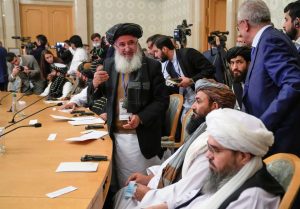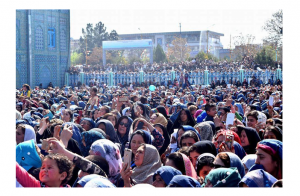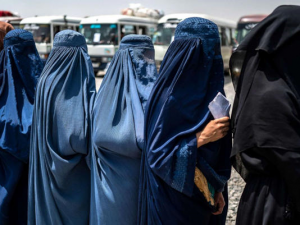It is obvious that the withdrawal of US-NATO forces from Afghanistan has been disastrous for the people of that country. What is less obvious, however, are the subtle ramifications of the withdrawal for the United States itself. Depending on the future unfolding of events in Afghanistan and other parts of the world, these ramifications can range from negligible to devastating. Yet, what is obvious is the fact that the withdrawal from Afghanistan has led to elation among Washington’s foes and concern among its allies. For the former the withdrawal is seen to spell the end of unilateralism at the world scene. For the latter abandoning Afghanistan in the hands of the Taliban raises questions about Washington’s political stamina and reliability to remain faithful to the security promises she has made and will make in the future.
Media reports indicate that the hasty and chaotic withdrawal from Afghanistan has been disappointing and painful for many American men and women who served in that country from 2001 to 2021. The heartbreaking media reports coming out of Afghanistan, no doubt, concern and embarrass great many Americans famed for their generosity and responsiveness to the plights of people in other parts of the world. The chaotic withdrawal from Afghanistan, along with rising U.S. domestic concerns and uncertainty, undoubtedly, played a role in midterm elections and will have consequences for the next presidential election in 2024.
Over all the unpleasant outfalls of the withdrawal, what may be more important from a longer-term perspective are its ramifications for the future of U.S. prestige and position in the world. After Vietnam and Iran, this is the third time that the U.S. abandons her ally in chaos and disgrace. The timing and the way in which the withdrawal was handled cast doubt on the operational strength and competency of the U.S. military, while posing troubling questions about the political wisdom and geostrategic savvy of the leaders of the world’s sole superpower.
To be fair, of course, there were multiple reasons for the tragic collapse of the Islamic Republic of Afghanistan. Bad governance, dishonest leadership, corruption, and abuse of power were among the contributing factors of the collapse. Yet, one should not forget that 1) these reasons were also, at least partly, the result of decisions made in Washington, and 2) with all its shortcomings, the heart of the democratic way of life in Afghanistan was still pulsing and had a chance to survive if the U.S. had persevered and enabled the younger generations of Afghans to rise against special interests that were holding the country back. From the very beginning of the invasion, it was obvious that working with the warlords, and trying to use them as a vehicle for installing democracy, was a grave mistake. This mistake blocked the way for genuine reform, honest governance, establishment of justice, and consolidation of democracy. No country can build democracy and make peace with the help of those who come from the killing fields of war and long years of tyranny and violence.
On May 1, 2012, the U.S. President Barak Obama and the Afghan President Hamed Karzai signed a bilateral agreement entitled Enduring Strategic Partnership Agreement (SPA). In the same year, during a visit to Kabul, U.S. Secretary of State Hillary Clinton designated Afghanistan as a major non-NATO ally (some other countries in this group are Australia, Egypt, Israel, and South Korea). Following the signing of SPA, the Bilateral Security Agreement (BSA) was signed on September 30, 2014. On the same day a NATO Status Force Agreement was signed between the Afghan government and NATO.
All these steps were seen by the Afghans as the bedrock of their future security. Afghans did recognize the fact that they had problems with governance and handling the intricacies of democracy. Yet, they were hopeful that with time, and, of course, U.S. continuing support, they will overcome the problems they were facing. No one among them, including ordinary people and their leaders, could ever imagine that someday America will pull out of the commitments she had made regarding the safety and security of their country.
Most importantly, the Strategic Partnership Agreement included the US commitment in the areas of protecting/ promoting democratic values, advancing long-term security, strengthening Afghan institutions, and building institutions of good governance. The SPA was not only a promise of US long-term commitment to the security of Afghanistan but also expressed a clear vision of the future U.S.-Afghan relationship and preservation of democratic values, human rights, and women rights. In spite of all these commitments and hopes, the withdrawal happened with haste and the achievements of two decades of hard work and heavy investments were lost overnight.
The U.S. withdrawal in August 2021 that followed the signing of an agreement between the U.S. and the Taliban in Doha in 2020, left the fate of 40 million Afghans in the hands of an extremist group that has no idea of how to run a civilized government. Moreover, the group has been responsible, directly or indirectly, for the deaths of over 2700 American service men and women and tens of thousands of innocent Afghan men, women, and children.
Negotiating with an extremist group, whose adherence to peace, socio-political inclusiveness, and international law are suspect, is certainly a recipe for a disastrous future for the country concerned, in this case for Afghanistan. Signing an agreement about the future fate of a nation, while the representatives of that nation are excluded from negotiations, is a gross strategic/moral mistake and can have devastating consequences for everyone concerned.
The flawed agreement signed between the U.S. and the Taliban in Doha has certainly undermined the U.S. credibility in the world. From the viewpoint of the Afghan people, the absence of their representatives in the negotiations has made the agreement an unacceptable piece of paper. Because of the amoral and illegal nature of the agreement, there is no wonder that from day one of their entry into Kabul, the Taliban have violated all its clauses.
Sidestepping the elected government of Afghanistan in Doha negotiations had a devastating and demoralizing impact on the Afghan armed forces, forces that were built with $80 billion of U.S. taxpayers’ money. Moreover, the withdrawal compromised the safety and security of hundreds of thousands of Afghans, including security personnel, civil society/democracy activists, media personnel, and politicians who had cooperated with the U.S./NATO forces.
At the same time, there is no doubt that U.S. withdrawal from Afghanistan has paved the way for her foes and rivals to gain confidence and become more assertive globally. Russian war in Ukraine, China’s threats against Taiwan, Iran’s rising prestige in the Islamic world and her speedy approach towards becoming a nuclear power, OPEC and Saudi conduct in pushing world oil prices, Central Asian increasing dependency on Russian security umbrella, and the gathering storm of Jehadi activities in and out of Afghanistan are all consequences of the hasty U.S. withdrawal from Afghanistan.
The US withdrawal from Afghanistan and the way it happened, has devasted U.S. credibility on the international scene and puts into question the U.S. faith and adherence to promises she makes. U.S. withdrawal from Afghanistan also displays a stark inability or unwillingness on the part of American leaders to protect her allies against terrorism and extremism. The result of all of this will be less respect for the U.S. and more adventures and miscalculations on the part of her rivals, a situation that can adversely affect American prosperity and raise the level of threats to the world peace. There is no doubt that mistakes on the part of the U.S., as the leading military power of the globe, will have devastating effects on peace and order in the rest of the world.
As far as Afghans are concerned, the U.S. withdrawal from their country left their fate in the hands of an extremist group who has been responsible for the killing of over 2700 American service men and women and tens of thousands of innocent Afghan men, women, and children. From the Afghan perspective, fighting an extremist group for 20 years and suddenly leaving the field and allowing the group to come back and occupy the country seems odd, if not impossible.
During the two-decade long U.S. presence in Afghanistan, life turned better for millions of Afghan men, women, children, and youth. Thousands of primary, secondary, and tertiary schools were built, public health improved, many new public and private universities were founded, thousands of kilometers of roads and new bridges were built, new housing projects were launched, life expectancy rate rose, child mortality rates declined, and Afghans, including women and girls, began to enjoy freedom of speech and the right to vote. Moreover, an elected parliament was instituted, elections were held, and an independent human rights commission was established. The overwhelming majority of the Afghans were supportive of these changes and thankful to the United States for making them possible. With the withdrawal of troops all these achievements came to an abrupt end and Afghanistan and its people were thrown back to the Middle Ages.
As a final note, it should be stated that Afghanistan is a country that has long experience in the art of national survival. The U.S. withdrawal threw Afghanistan back into the Middle Ages, but it cannot break the will of its people to survive and make a new beginning.





